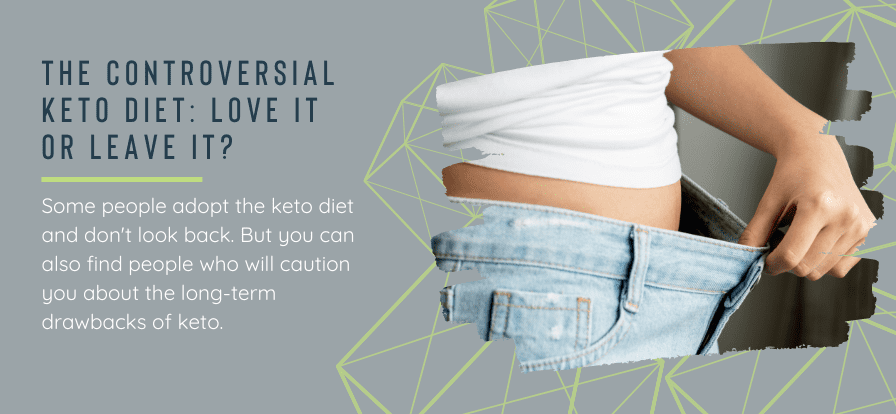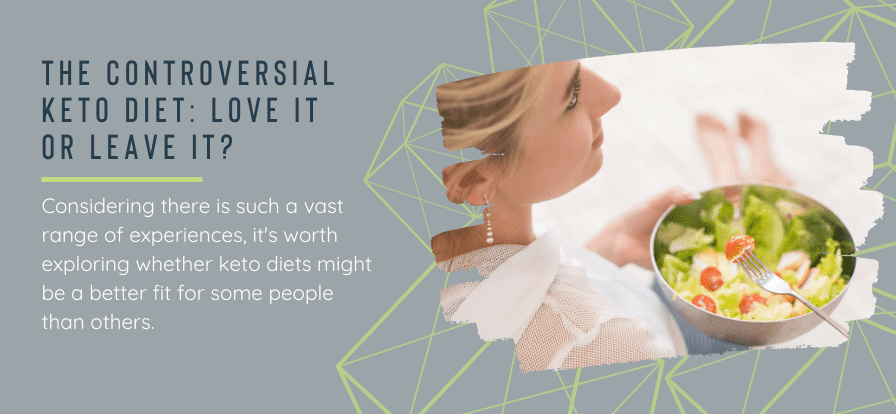The Controversial Keto Diet: Love It or Leave It?
Written by Stephanie Hodges, MS in Nutrition and Exercise Science, Edited by Martin Ebner, head PT and Sports Nutrition Specialist at Ebylife.
The keto diet has been all the rage for a few years now. Depending on who you talk to, it's either the most remarkable health breakthrough of all time or just another trendy fad.
Celebrities, athletes and everyday people swear by its benefits while others have tried keto and run the other way. Even the medical community is divided. Some doctors have written books about the keto diet touting it as a cure-all, and others say they don't recommend it under any circumstances.
So should you try the keto diet or avoid it? In this blog post, we'll cover the basics of following a ketogenic diet, and how and why it works for weight loss. Then we’ll take a look at the pros and cons. After reading, you should have a better idea of the cost and outcomes of the keto diet.
What Is the Keto Diet?
The keto diet originated in the 1920s as a treatment for epilepsy, particularly for children. The principle behind a ketogenic diet is that when you deprive your body of carbohydrates, it enters ketosis, which can stabilize blood sugar and reduce inflammation.
When you follow a keto diet correctly, your body will burn fat stores for energy instead of using carbohydrates as its primary fuel source.
Ketosis can lead to weight loss, improved mental clarity, and decreased inflammation throughout the body. Your body can also enter a ketogenic state due to intermittent fasting, starvation, or prolonged exercise.
Related: 5 Best stimulant-free fat burners for men and women
How Does the Keto Diet Work?
The three primary macronutrients we consume in our diet are protein, fat, and carbohydrates (which are broken down into glucose). Our bodies prefer to use glucose for energy, but when carbohydrates are limited, they'll look for other sources.
With limited carbohydrates and protein, our liver produces acids called ketones, or ketone bodies, from stored fat. Our brain and other tissues can then use these ketone bodies for energy. This puts your body in the state of ketosis, and your primarily metabolic pathway is now fat burning instead of glucose.
A ketogenic diet consists of very low carbohydrates, moderate amounts of protein, and high amounts of fat. On the standard ketogenic diet, you consume
75% of daily calories from healthy fat
20% of daily calories from protein
5% of daily calories from carbs
In general, you should aim for 20-50 grams of carbohydrates per day to achieve ketosis. This requires some intense dietary programming and is pretty much the opposite of approaches such as intuitive eating.
How Do You Know if You're in Ketosis?
If you're limiting your carbs, does that automatically ensure you're in ketosis? Serious keto fans will take extra measures by testing their blood, breath, or urine for ketone bodies.
Ketone test kits are available online and at some drugstores and pharmacies. The most accurate way to measure ketosis is through a blood test, but this requires a visit to your doctor.
You can also look for telltale symptoms your body is transitioning into ketosis, such as temporary fatigue, dry mouth, increased thirst, and flu-like symptoms.
What Are the Pros and Cons of the Keto Diet?
Some people adopt the keto diet and don't look back. They claim that this diet has extensive medical and physical health benefits beyond weight loss. But you can also find people who will caution you about the long-term drawbacks of keto. So let's look at both sides.
Pros of the Keto Diet?
To let you know up front, many of the studies on the keto diet have been done with rats. However, researchers have also done some promising pre-clinical studies and continue to look at more long-range effects. Much of the research and anecdotal evidence points toward the following benefits.
Weight loss. Losing weight is probably the top reason people turn to the keto diet, and it's proven effective for controlling appetite, decreasing visceral adipose tissue, and losing weight overall.
Reduced inflammation. A keto diet may improve markers of inflammation throughout the body.
Lower blood sugar and improved insulin sensitivity. Keto may help keep blood sugar levels in check and improve insulin sensitivity in people with Type II diabetes.
Increased mental clarity and focus. People report increased mental clarity and focus when following a keto diet.
Improving symptoms of neurological disorders. Through decreased inflammation and other mechanisms, a ketogenic diet may improve the symptoms of Alzheimer's disease, Parkinson's disease, multiple sclerosis, and other neurological disorders.
Impeding cancer growth. A ketogenic diet may help to limit cancer growth through anti-inflammatory and proapoptotic (causing the death of cancer cells) measures.
Cons of the Keto Diet?
On the other hand, you should be aware of some potential drawbacks to the keto diet before starting.
The keto diet is very restrictive. This can make it hard to stick to long-term and adhere to in social situations.
May lead to nutrient deficiencies. Because you're limiting certain foods, those on the keto diet risk being deficient in nutrients like fiber, vitamins, and minerals.
The keto diet can cause digestive issues. Because fiber is limited on the keto diet, you may experience constipation. Others have digestive complaints such as diarrhea and nausea.
The keto flu. When first starting the keto diet, some people experience what's known as the "keto flu." This group of symptoms includes fatigue, headaches, muscle aches, and nausea. The keto flu usually goes away after a few days or weeks.
Bad breath. Although it's mainly an inconvenience for other people, the acetone from ketones can cause bad breath, which is characteristic of the keto diet.
Raising LDL cholesterol. Some studies have shown that the ketogenic diet is correlated with increased LDL cholesterol.
Because of your limited food intake on a keto diet, it’s essential that you take a high-quality multivitamin, even if you’re only doing keto short-term.
Related: 4 Reasons You Can’t Stick to Your Low Carb Diet
Is the Keto Diet OK for Everyone?
Considering there is such a vast range of experiences, it's worth exploring whether keto diets might be a better fit for some people than others. In some cases, the keto diet could be seriously ill-advised from a medical standpoint.
In particular, populations that should be especially cautious about attempting the keto diet include:
People with gastrointestinal conditions
Pregnant women
People with adrenal fatigue
Those with an eating disorder or history of disordered eating
Anyone with conditions affecting their kidneys, pancreas, liver, thyroid, or gallbladder
Children or the elderly
As with all diet advice, consulting your physician is a must. They have the best insight into your unique medical history and can help you determine whether or not the keto diet is right for you.
What Is the Final Opinion on the Keto Diet?
According to Statista, over the past few years, Google searches for "keto" peaked in Q1 of 2020 but were down during that same period in 2021. So, could it be that the keto diet's popularity is already declining?
Over the years, diets have tried to manipulate macronutrient intake and seen temporary success. We had the low-fat craze of the 80s and low-carb plans of the 90s and early 2000s. The fact is, when you limit your food options, you tend to reduce caloric intake naturally. And this will help you lose weight.
But the real question is: can you maintain the diet and weight loss?
Because of the above drawbacks, the keto diet may not be a healthy choice for a long-term eating plan. However, if you use the keto diet for a kickstart, and then establish sustainable long-term habits to maintain your weight, then it could help you break through a plateau.
Remember, if you go straight back to old habits, you'll simply regain the weight!
A well-balanced eating plan and exercise program are your ultimate key to maintaining an ideal weight, boosting your energy, and being healthy.
Check out our Project Weight Loss diet plans for men and women for a more sustainable plan that works long-term and can fit any lifestyle.
References:
History of the Ketogenic Diet. https://www.news-medical.net/health/History-of-the-Ketogenic-Diet.aspx
The ketogenic diet: Pros and cons. https://www.sciencedirect.com/science/article/abs/pii/S0021915019315898
Obesity and tumor growth: inflammation, immunity, and the role of a ketogenic diet. https://www.ingentaconnect.com/content/wk/cocnm/2016/00000019/00000004/art00010
Ketogenic Diets for Adult Neurological Disorders. https://link.springer.com/article/10.1007/s13311-018-0666-8
The keto diet and the gut: cause for concern? https://www.sochob.cl/web1/wp-content/uploads/2019/12/The-keto-diet-and-the-gut-cause-for-concern.pdf




